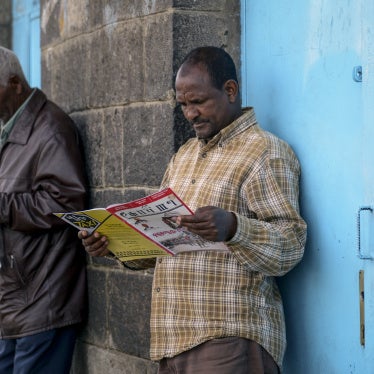Your Excellency,
As the Security Council's Working Group on children and armed conflict prepares to discuss Chad on September 5, we wish to highlight the deteriorating rights climate for children in Chad, and urge you specifically to press for the full implementation of the Working Group's previous conclusions of September 24, 2007 (S/AC.51/2007/16). The need to take concrete action is especially urgent as the conflict in Chad enters its fourth year and the use and recruitment of children persists with all armed forces and groups involved in these abuses.
On May 30, 2008 the Special Representative to the Secretary-General on children in armed conflict secured a promise from Chadian Prime Minister Youssef Saleh Abbas to allow UN child protection officials unimpeded access to Chad's main military camp, military instruction center and its military detention center. While Human Rights Watch welcomes this important step taken by the Chadian government to halt recruitment and demobilize children from its armed forces, it is also wary that previous undertakings in this vein have not been effective. For example, in May 2007 the government reached a formal agreement with UNICEF to demobilize all children from the Chadian National Army (ANT), which represented an important milestone. Chad's commitment to that demobilization effort, however, remains largely rhetorical: the vast majority of the 512 children released from the government army to date, more than 93%, were former members of rebel factions that joined the ANT under the auspices of peace accords.1 Demobilization of child soldiers from the ANT itself has therefore been negligible.
Far from demobilization, the use and recruitment of children is ongoing. In June 2008, a Human Rights Watch fact-finding mission found recruitment of children into the ANT to be routine in displaced persons sites in the Goz Beida area of eastern Chad, with instances of forced recruitment documented in Gouroukoun camp in the wake of a February 2008 Chadian rebel invasion. In his August 2008 report on child soldiers in Chad, the UN Secretary-General noted that children who had been recruited into the ANT have subsequently reported serious abuses while at government training camps.
Children in Sudanese refugee camps in eastern Chad are also subject to recruitment, primarily by the Justice and Equality Movement (JEM), a Sudanese rebel group that receives backing from the Chadian government. Reports from the camps suggest that JEM now regularly recruit from a large number of camps in eastern Chad. Indeed, at the Djabal refugee camp in February, agents from the state intelligence bureau (Agence Nationale de Sécurité, ANS) arrested members of a rival Sudanese rebel faction that had been conducting recruitment there, thereby allowing JEM to carry out recruitment drives instead. These drives have included recruitment of children. Improving child protection in Chad depends on concrete actions on the ground, beginning with the government's implementation of the recommendations made by the Security Council Working Group on children and armed conflict in September 2007, including:
- Developing a time-bound action plan to prevent illegal recruitment and demobilize child soldiers;
- Establishing a national institution to coordinate the release and reintegration of children associated with armed forces and groups;
- Criminalizing the unlawful use and recruitment of children under domestic laws; and
- Strengthening the commitment of law enforcement and judicial officials to rigorously investigate and prosecute crimes against children.
The Chadian government has had more than a year to implement the Working Group's recommendations, but it has failed to take effective action. Instead, it has demonstrated disregard for the will of Security Council as well as international law by continuing to use and recruit child soldiers.
Human Rights Watch strongly supports the Secretary-General's call for the Chadian government to appoint a focal point within the presidency to follow up on child protection issues and to coordinate those efforts with the United Nations. Human Rights Watch urges members of the Security Council Working Group to remind all armed forces and groups in Chad that the use of child soldiers under the age of 15 is a war crime, whether carried out by members of national armed forces or non-state armed groups. The Chadian government specifically should be reminded of its obligation under international law to investigate alleged war crimes by their nationals, including members of its armed forces, and to prosecute those responsible. Should the Chadian government fail to fairly and credibly investigate and prosecute those responsible for war crimes, the crimes may fall within the jurisdiction of the International Criminal Court (ICC).2
The United Nations and donors should be encouraged to make strong financial commitment to capacity building and infrastructure improvements in the Chadian judicial and corrections systems. Long-term donor support for reintegration programs is also crucial. We also urge the Security Council to mandate sufficient child protection resources to the United Nations in Chad, including to its multidimensional civilian protection force, the United Nations Mission in the Central African Republic and Chad (MINURCAT). MINURCAT civilian police officers should provide capacity building to the Integrated Security Detachment (Détachement Intgréré de Sécurité, DIS), a force of Chadian police officers who will provide security in refugee camps and sites for displaced Chadians and towns in eastern Chad, in the investigation and prosecution of crimes against children.
A new round of fighting is widely anticipated after the end of the rainy season in September, and children are sure to be on the front lines. Far less certain is how many child soldiers will die in combat before peace is reached Chad, and how many have already lost their lives.
Thank you for your continued attention to violations against children in Chad's conflict, and your efforts to protect them from further abuses.
Yours Sincerely,
Steve Crawshaw
United Nations Advocacy Director
Georgette Gagnon
Executive Director, Africa Division
Jo Becker Advocacy
Director, Children's Rights Division
1More than one-third of the children demobilized to date have been 14 years of age or younger. 2Chad ratified the Rome Statue of the ICC on November 1, 2006.








